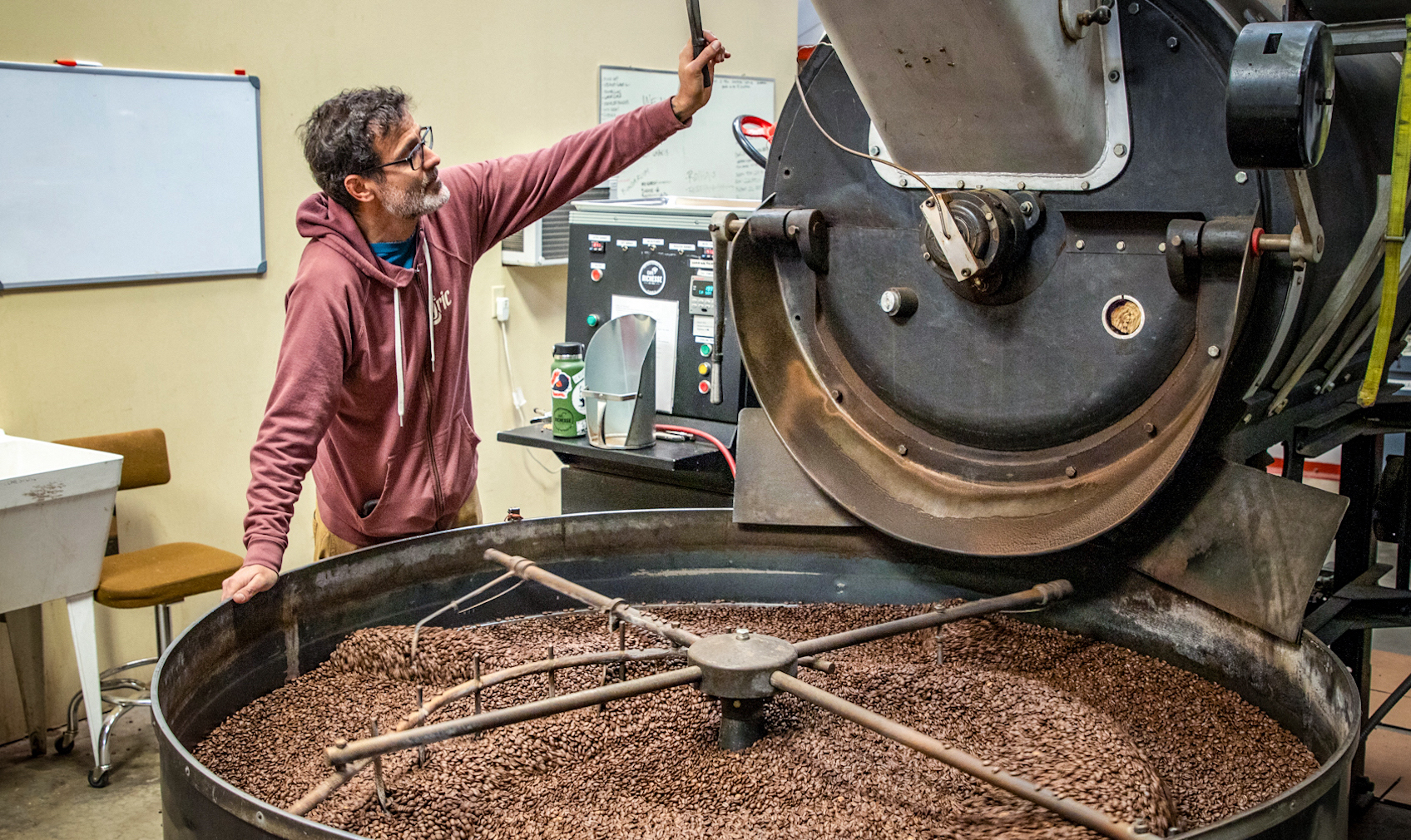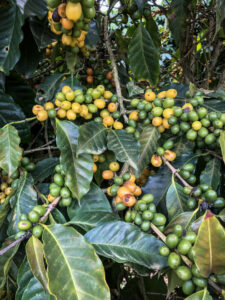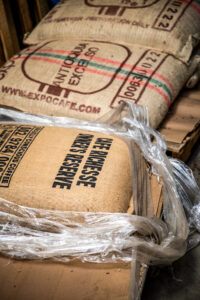
Thirty-two years ago, CSU alumni Paulo and Peggy Neves and their two teenage sons moved to the United States from Bahia, Brazil, and started roasting coffee beans in a small backyard shed at their home in Fort Collins.
Today their expanded roastery, featuring a rare Probat roaster built in 1932 in the Ruhr Valley of Germany, spans three units at a warehouse off Lincoln Avenue in north Fort Collins. Now called Café Richesse, the roastery supplies several local restaurants and Front Range markets with gourmet roasts and blends, including two campus coffee shops and two bagel shops managed by Lory Student Center Dining.
The beans cultivated for the coffees brewed in these shops are grown and harvested from the Neves family farm in Brazil. Their business is unique among Northern Colorado roasteries; the operation integrates growing, harvesting, roasting and distributing – venturing beyond fair trade and into direct trade.
“We can control quality of the product from the ground to the grind,” Luiz Neves said. “In that way, it’s truly remarkable.”
Luiz, 47, is Paulo and Peggy’s youngest son and has been majority owner at Café Richesse since 2016. Luiz’s parents, both in their 70s, still work part-time at the business, and Daniel, 50, is a green coffee broker for the company in Denver.
Luiz’s cousin, Fernando Neves, is an agronomist in Brazil and oversees the actual planting and operation of the family farm there. Somewhere between 80% and 90% of the Arabica beans Café Richesse roasts and distributes are cultivated on the farm, Luiz said, using drip-irrigation technology pioneered at Tel Aviv University in Israel and advanced by research at CSU.
“Obviously there are coffees we can’t grow ourselves but still distribute – Sumatran coffee has to come from Sumatra, and Columbian comes from Columbia, but most of the rest is our own,” he said.
Roots in CSU community run deep
The family’s connection to the university is as rich as the coffee they produce. Paulo, Peggy and both of their sons are graduates of CSU. Paulo graduated with bachelor’s and master’s degrees in sociology in 1970 and 1973 respectively, and Peggy earned a bachelor’s degree in linguistics, and a master’s degree in linguistics in 1972. Daniel graduated in 1997 with a bachelor’s degree in economics, and Luiz earned a bachelor’s degree in history in 2000 from CSU’s College of Liberal Arts.
Luiz fondly remembers his experiences as a student at CSU, including escaping campus from the catastrophic flood of 1997 in his Volvo, earning his spot on the Dean’s List, being a French tutor and working in the audiovisual department in the Clark building. He’s also grateful for the relationships he’s made more recently on campus as an entrepreneur, especially with the LSC Dining department and its director, Geoff Valdez, whom he considers a close friend.
Luiz met Valdez in 2010 after the passing of Ken DeVault, former retail operations manager at the LSC, who had brought Café Richesse into Cram-A-Latte, the coffee cart in Morgan Library that preceded Morgan’s Grind. At that time, Valdez was a manager at the Ramskeller and was asked to take on more responsibility, and Luiz reached out to offer help with managing supply, he said.
“As it turns out, we were students on campus at the same time, and could share many stories,” Luiz said.
Valdez said he appreciates Luiz’s approach and values the professional connection the two have built over the years.
“Luiz and his team have built strong relationships with our Lory Dining Service team and recognize and embrace our student model – student managers placing the orders for coffee, managing inventory and selecting seasonal blends,” Valdez said. “They even keep an open door at their manufacturing plant in industrial Fort Collins for our student leadership teams to come out, tour, and do cuppings and tastings.”
Café Richesse coffees are now featured on menus at Bagel Place and Bagel Place 2 in the Lory Student Center, Morgan’s Grind at Morgan Library, and the Bean Counter at Rockwell West.

From Salvador to Fort Collins
The story of his family’s history, and their experience building the business, is particularly motivating to Luiz, as he says it has created direction and meaning in his life.
‘It’s a wonderful story,” Luiz said, “and I love telling it.”
His father Paulo, Luiz explained, was born in the city of Salvador in the state of Bahia, Brazil. He had learned the Peace Corps, an international cultural exchange program, was coming to Brazil and offered his skills, which included speaking English, to professors at the University of Bahia as both a liaison and translator.
He was drawn to Fort Collins as a young adult because of his interest in working with the Peace Corps.
According to Luiz, the Peace Corps in Bahia took him up on it, and Paulo soon learned that because of this connection, he could apply to CSU. He was accepted and started at CSU in 1966. By 1968, Paulo was hired by the Peace Corps to teach Portuguese to prospective volunteers in Brattleboro, Vermont, and there he met his future wife, Margaret, aka “Peggy.”
The couple finished their studies at CSU, eventually wed and returned to Salvador in the late 1970s to begin their professional lives and to start a family.
Roads lead back to Fort Collins
The Neves family purchased the farm in Brazil in 1980, Luiz said, and in the early 1990s, the country’s economy went into a tailspin. Paulo and Peggy became concerned about their financial future there in the months and years ahead.
“My father got an ulcer and a migraine headache on the same day,” Luiz said. “The first democratically elected president in 30 years (Brazil was ruled by the military for 21 years) froze everyone’s bank accounts in the hopes of stemming inflation, and that was tough for us all. My father said, ‘We’re leaving. Let’s go to the United States. If things get bad in the United States, we’ve also got Brazil to come back to.’
“My parents had gone to college at CSU, so they understood and liked Colorado, and saw that there was potential here to thrive, to open a business. So, the family moved here,” Luiz said.
Once settled, Paulo and Peggy turned their thoughts to starting a business.
“Our idea originally was to market green coffee – unroasted coffee – to roasters,” Peggy said. “We soon found out that that probably was not a very profitable idea, and the thing to do would be to roast coffee ourselves, bringing in coffee from our farm and other resources.”
It was an excellent time for this business model, as the demand for gourmet coffee in United States was escalating, and companies like Starbucks were starting to flourish as Americans developed a taste for a richer, more complicated brew.
“I really have to give my father credit,” Luiz said. “He knew that the market for gourmet coffee was on the rise when he got into it in 1993. I don’t know if I would enter the market today. It’s incredibly competitive now, and to distinguish oneself is hard, but it can be done.”

Cultivating a sustainable future
On roasting days, a rich, earthy aroma fills the space, and the intermittent sound of beans as they tumble to their destiny interrupts the persistent hum of the machine. It takes 14 to 15 minutes at 420 degrees in the rotating drum to roast a single 132- to 150-pound bag of green coffee beans. Master roaster Ricardo Lima, who’s worked with Luiz for 18 years, watches over this process, taking in the changing smells and colors, listening for telltale sounds, and checking dials for temperature levels.
“Coffee cracks,” Lima said. “It’s a lot like popcorn. Before I had the dials, I had to know by ear.”
He heads to the supply room where burlap bags of green coffee, shipped directly from the Neves farm in Brazil, are stacked several bags high, waiting for their time in the roaster. He opens and loads another bag, and the whir of the compressed-air auger alerts us to the movement of the beans down the line.
Back on the farm, where the environment is perfect for producing gourmet Arabica beans, sustainability is built into the production routine. A portion of the land is left in forest, providing natural habitat for wildlife and birds.
“It’s great for the ecosystem, and for the animals,” Luiz said. “The timber is still standing, so the birds can nest there, armadillos and snakes can burrow there, and so on. This reduces the number of pests that attack the coffee plants because they prefer the natural environment.”
“We have water rights in Brazil,” he said, “so we draw water from the river nearby, and it is pumped into a tank at a high point on the property. Gravity then takes it down and through pumps and other systems; it goes into piping that pours water directly on the roots of the coffee plants. That’s very beneficial because it’s efficient – we don’t have to dig ditches, we don’t have to waste water, and there’s not much runoff.
“In the absence of rain, we’re able to have a continuity of crop growth, even in droughts,” Luiz said.
Preparing for growth in future years
The Neves family is looking forward to expanding sales to retail outlets in the future.
“The pandemic opened the area of retail, particularly online. People didn’t want to go to coffee shops – they preferred brewing up coffee at home. I wonder if the coming generations, some who kind of prefer being isolated, that there might be a cultural shift that will have to become accustomed to,” Luiz said.
In the meantime, the family intends to keep building relationships and delivering a unique, high-quality product. Café Richesse has embraced its role in the community, Luiz said.
“We sell a lot of coffee up and down the Front Range,” Luiz said. “There are a good dozen or so companies in Colorado that are sizable, and we’re one of them. There’s a good half dozen in Fort Collins who are players, and we’re one of them, too. I am very happy to be part of such a strong market and among such great vendors.”
For 17 years, they’ve also been a fixture at the Fort Collins Farmers Market and have worked with local Extension services to support other agricultural activities.
“Business is at least as much your intelligence as your heart. You have to have a deep belief in what you’re doing. It’s the story of my family that gives me that belief, and I am grateful to be part of that continuity,” he said.